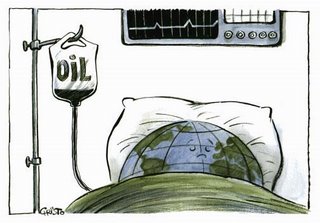Slowly a consensus has emerged. Oil, the lifeblood of modern societies, is going to peak then decline irreversibly. Oil will be used for decades to come, but the era of surplus, conventional oil is ending, and we are not prepared.Mathew Simmons' first words are:
If we have a shortage, it's a lights out event.Also narrating are: Paul Domjan , Neil McMahon, an analyst at Sanford Bernstein, and Andrew Curry of the Henley Centre Consultancy. Get the bittorent here.
Blending drama and documentary, the IF series returns with a film investigating a scenario many experts fear will come true.Also on Discovery, Clean Fuels.
When the cheap oil we depend on starts to run out, we may not be able to take anything for granted any more.
Drama
It is 2016 and the world is in crisis.
Global supplies of oil cannot keep up with soaring demand and the price of petrol is going through the roof.
The oil companies are in a desperate race to find any remaining oil reserves but what happens if there is no more out there?
Combining expert interviews with a fictional story line, the drama-documentary examines how our lives will change as the price of fuel starts to spiral out of control.
The film interweaves the story of Jess, an exploration geologist working for an international oil company, with the impact of the fuel crisis on her parents back home in Minneapolis.
Instability in the Middle East has caused an "oil shock" and the price of crude is rising day by day.
At the start of the film it is around $85 (£45) a barrel - in spring 2006 it is about $65 (£34) - but by the end of the drama the price has climbed to $160 (£85).
As the story unfolds, expert interviewees - including Paul Domjan, Former Energy Security Adviser at the US Dept of Defence, oil analyst Matt Simmons and the legendary former Saudi Arabian Minister of Oil, Sheikh Yamani - explain how the crisis will have an effect on every part of our lives.
We will not just be paying a lot more - £2.35 per litre or $5.88 per US gallon - to fill up our cars, we will be charged much higher prices for food, heating and light.
Long distance travel will become increasingly expensive and we will even think carefully before using the car for what we used to regard as routine trips to the shops.
Recession
As the economy goes into recession, Jess's parents find their world collapsing around them.
From Newsweek: The New Coal Car. The article makes the claim:
With the world's largest coal reserves, the United States has enough coal to power the country for another century at least.However, such claims are based on current usage levels, not the ones that would be required for complete replacement of oil usage.




